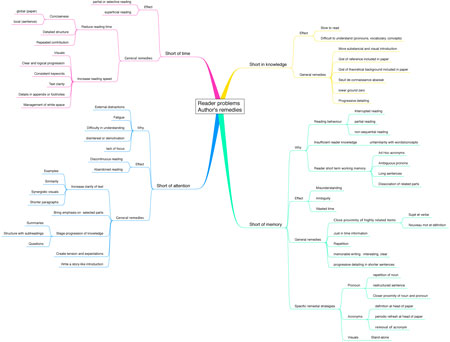
Home >
The Bonus Page >
Mindmap
Mindmap

Click here to download the full size:
Readers are scientists, but they are not androids. As humans, they are superior to machines in certain ways, but not all. For example, they are short of attention, particularly when reading a difficult paper. Concentration takes its toll and the body indicates in no uncertain terms that it is time to do something else: drink, get up, call someone, look elsewhere, read something more pleasant, move to a more attractive occupation. Humans are short of time. They feel the passage of time. The outside world constantly demands its share of your time. Reading that fails to rapidly deliver its expected new knowledge is source of impatience. Humans are short of memory. What the neuroscientists call "the working memory" is limited. Unless it is periodically refreshed, it is selectively erased to make room for the most recent demands on reader memory. What seems unimportant or of no immediate use is quickly forgotten. Finally, humans have limited knowledge. They reconstruct the world described in the written text using their own bricks and mortar. These are not always sufficient to rebuild what the writer had in mind. Bridging the knowledge gap is a tough civil engineering exercise involving foundation work and scaffolding to support new concepts and cement new knowledge.
This mindmap looks at our human shortcomings and suggests ways to address them to improve the efficiency of our reading activity. All items on the mindmap are developed and illustrated in the book "Scientific Writing 2.0: a Reader and Writer's Guide".

